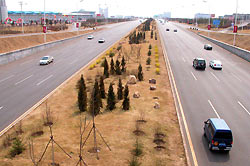|
Transport attracts soaring foreign investment
By Cao Desheng (China Daily)
Updated: 2005-04-25 23:52 Overseas investment in the advanced transport
market has exceeded domestic investment in the sector for the first time, the
Ministry of Communications announced yesterday.
 |
| The photo shows a section of the highway linking Shenyang and
Benxi, Northeast China's Liaoning Province, April 8, 2005.
[newsphoto/file] |
Among 47 new projects approved by the ministry last year, overseas investment
accounted for 51 per cent of the total registered capital.
In 2004 a total of 88 overseas funded projects were approved by the Ministry
of Communication, an increase of 44 per cent over the previous year.
The increase is a result of huge road construction projects and the open
passenger transport market which have bred vast business opportunities for
overseas investors.
Rising since 2001
Overseas investment in the market has seen year-on-year rises since it was
opened up at the end of 2001, said Xu Baoli from the communications ministry.
Thanks to the implementation of the Closer Economic Partnership Arrangement
(CEPA) between Hong Kong and Macao special administrative regions and the
mainland, investors can take advantage of preferential policies and put their
money into the transport market, Xu said.
"The increasing demand for road cargo transport, propelled by rapid economic
growth, has been a catalyst since the nation is short of competitive enterprises
that offer third-party services to customers," he said.
Fully open logistics
"This year marks the first year of China's market being fully open to
overseas capitals in logistics, road cargo transport and vehicle maintenance,
and a new wave of overseas investment is expected to sweep in," he estimated.
According to its commitment to the World Trade Organization (WTO), China will
permit WTO members to establish overseas-funded enterprises in the fields of
road cargo transport and vehicle maintenance from this year.
Meantime, passenger transport companies from Hong Kong and Macao are allowed
to operate businesses between the two special administrative regions and some
mainland cities by building joint ventures, Xu said.
They will also be allowed to operate taxi or bus businesses in major cities,
Xu said.
The nation plans to build an 85,000-kilometre expressway network within the
coming 30 years to serve the country's rapid economic growth.
The nation's road construction has been mainly financed by domestic
commercial loans and various government budgetary funds, which usually cover
around 90 per cent of the total investment.
"Overseas investment has also entered the road construction sector and has
played an important role," said Li Xinghua, deputy director of the ministry's
Department of Comprehensive Planning.
Overseas investment includes loans from the World Bank, the Asian Development
Bank, government loans from some countries and direct investment from overseas
companies, the official added.
(China Daily 04/26/2005 page1)
|